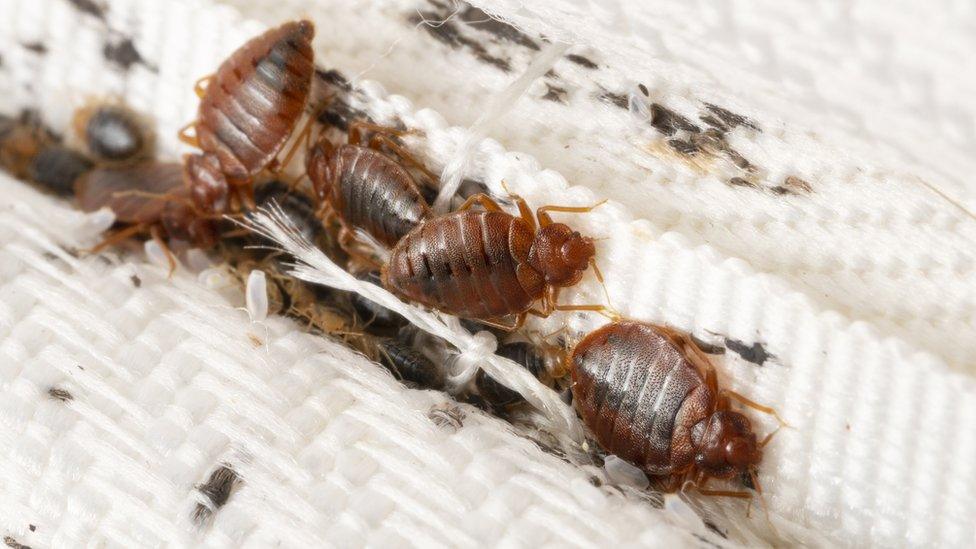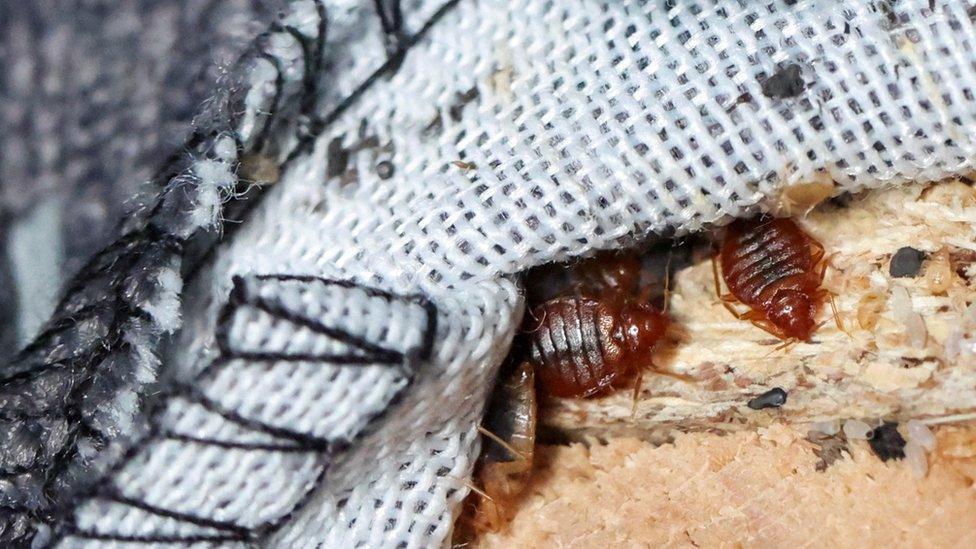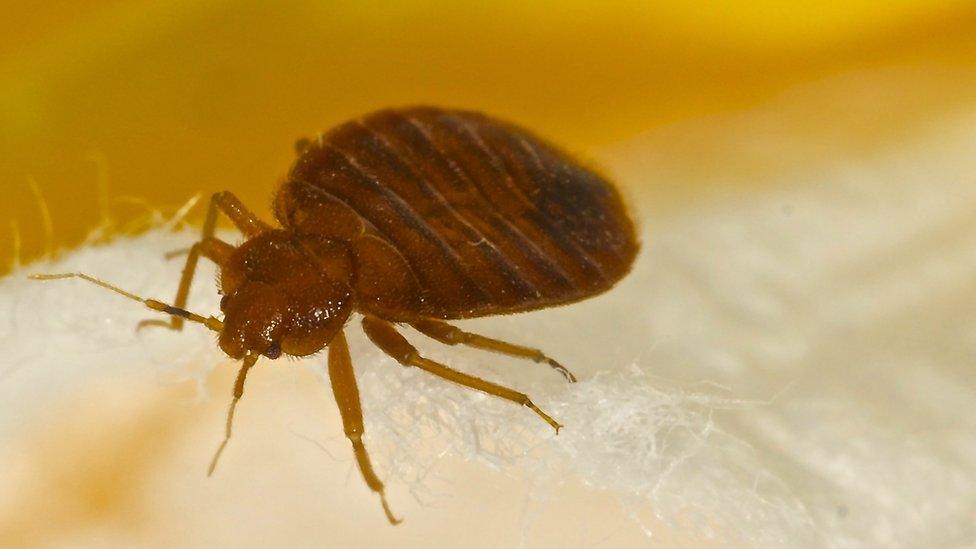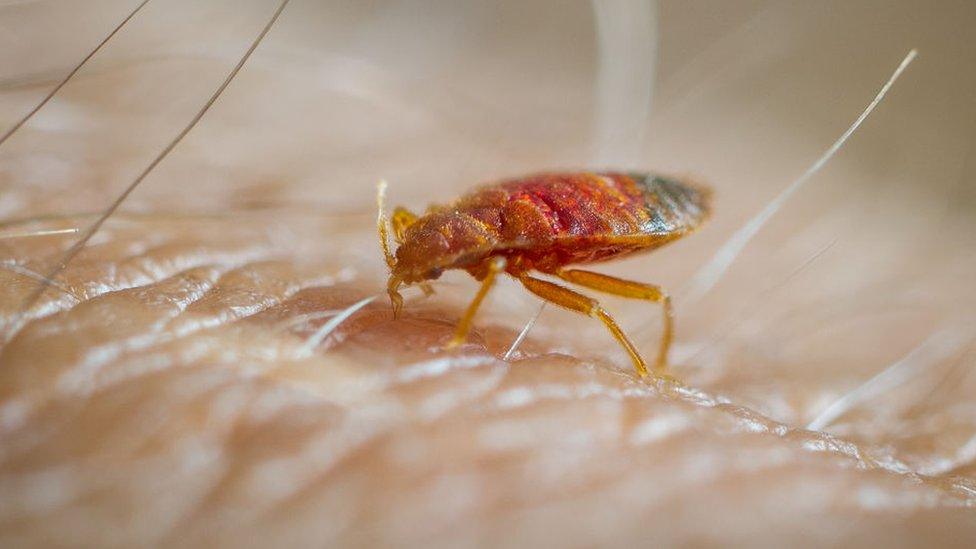Bedbugs: Luton Council deals with 86 bedbug incidents in a year
- Published
- comments

Bedbugs reach about 5mm in length, less than a grain of rice
A council which warned of an "alarming number" of calls to tackle bedbugs has said it dealt with 86 incidents in the past year.
Luton Council issued guidance on what people should do to prepare their homes for "treatment"
It also warned there were not "limitless resources" to tackle the issue.
The council had said, external its pest control teams were "currently receiving an alarming number of bedbug jobs on a weekly basis".
After failing to respond to initial BBC requests for a comment on the matter, the council has now said the information on its website was posted in 2019 and last updated in March 2020.
A council spokesperson said: "Nationally, the Chartered Institute for Environmental Health reported in September [that] figures from pest-control company Rentokil suggest the UK is facing a significant rise in bedbug infestations.
"It has reported a 65% increase year-on-year. Locally we have seen a much smaller increase. We have received 86 calls relating to bedbugs for the year ending September 2022/23, compared to 81 in 2021/22.
"The most recent month, September 2023, saw 15 calls compared to 12 in September 2022."
Bedbugs have been reported in cinemas, trains, hospitals and schools amid national panic over the issue in France, with many cases focused on Paris.
The council issued advice to homeowners wanting a visit from a council pest control officer.
Ahead of visits, it said beds should be stripped with bedcovers placed into sealed bin liners and, ideally, stored in a bath.
Wardrobes, drawers and bookcases should be emptied and contents also placed in sealed bin liners.
All furniture should be pulled away from walls with pictures and posters taken off walls to allow for inspection.

In Paris bedbug sightings have increased over recent weeks
Dee Patel, an entomologist, told BBC Three Counties Radio that lavender deterred bed bugs.
"Lavender oil masks their scent pattern and they can't cope with it," he said.
He also advised washing at high temperatures, vacuuming often and freezing sheets, which stops the bugs from breeding.
What do bedbugs look like?
Bedbugs are small, with adults reaching about 5mm in length (less than a grain of rice) and are oval-shaped. They have six legs and can be dark yellow, red or brown.
There are about 90 species worldwide, although the common bedbug (Cimex lectularius) has adapted the best to human environments, according to the British Pest Control Association (BPCA).
The term "bedbug" can be a touch misleading. As well as mattresses, they can also be found on clothing, furniture, bed frames, or behind loose wallpaper.
Is this problem anything new in the UK?
Bedbugs have been an issue in the UK for many years and were a "public health pest that is notoriously difficult to treat", said Natalie Bungay, from the BPCA.
They were a bigger issue in major cities.
Ms Bungay said the BPCA was not aware of any unusual increase in bedbug activity.
"There was a dip during Covid-19 due to the lack of global travel taking place, so any increase now could just be trends getting back to normal now that everybody is moving freely again," she said.
She added that seasonal increases in numbers, particularly as more people travel during the summer months, was nothing unusual.
"It's also worth remembering that not every call out for bedbugs will result in a positive identification of the pest - increased media attention or public awareness can often lead to false alarms."
How do you treat bedbug bites?
Although often uncomfortable, bedbug bites are not typically dangerous.
They can be very itchy, and there may be some painful swelling, but they usually clear up on their own in about a week - or they can be treated with some basic measures, which include:
Putting something cool, like a damp cloth, on the area
Keeping the affected area clean
Avoiding scratching
Antihistamines can help if bites are very itchy, while a mild steroid cream like hydrocortisone might be useful.
A severe allergic reaction, known as anaphylaxis, external, is possible but rare.
A GP appointment should be sought if the bites remained painful, swollen or itchy after trying treatments from a pharmacist, or if the pain or swelling around the bites was spreading.

Follow East of England news on Facebook, external, Instagram, external and X, external. Got a story? Email eastofenglandnews@bbc.co.uk, external or WhatsApp 0800 169 1830
Related topics
- Published5 October 2023

- Published8 October 2023

- Published6 October 2023
